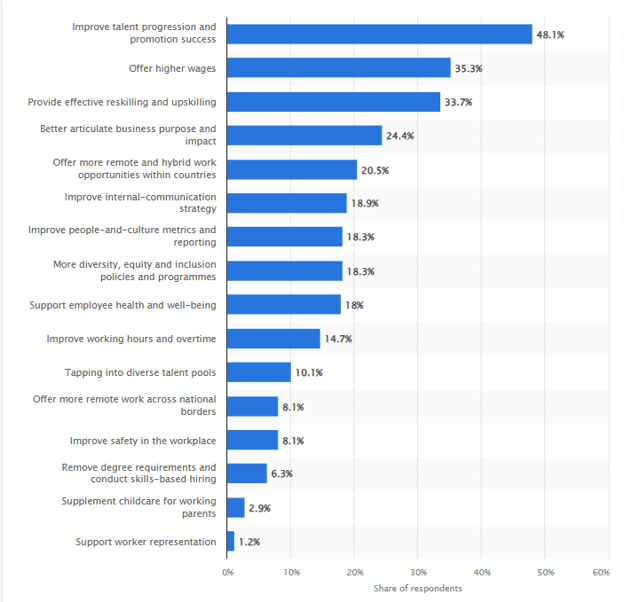7 reasons small businesses should upskill their employees
Small companies have ever-changing priorities. The changing needs and preferences of customers and keeping up with new tech make it hard to work out where to invest time and resources for the maximum benefit.
As technology moves fast and industries change, specific skills are in high demand. This means evolving, adapting, and staying ahead of competitors needs a skilled workforce.
Investing in your employee's skills can lead to tangible benefits.
This blog post will uncover seven reasons for prioritising employee upskilling. Be prepared for future challenges and stay adaptable to meet the changing needs of your small business.
What is upskilling?
Unlike reskilling, which entails acquiring new skills, upskilling involves mastering entirely new skill sets. For example, a graphic designer at a marketing agency learning to use advanced design software to enhance their skills and take on more complex design projects.
Upskilling can strengthen a small business by having a more versatile and capable workforce. Employee upskilling opportunities may include::
- Online courses and workshops
- Training programmes
- Industry-related seminars
- Professional certifications
- Compliance training
- Coaching and mentoring
- Job shadowing
Put simply, upskilling allows small businesses to build expertise by helping its people advance their personal and professional growth.
What are the benefits of upskilling employees?
Small businesses don’t usually have huge budgets. When they need to be mindful of their finances, upskilling programs provide a cost-effective way to keep employees happy and encourage them to stay with the company.
Considering one in three UK workers are quiet quitting, employee upskilling is critical to the future success of your small business. It’s hardly surprising that upskilling employees is one of the top four priorities for companies in 2023.
By investing in employee development, small businesses can empower their workforce to grow–enhancing employee engagement and long-term loyalty without solely relying on salary increases.
Let’s take a deeper look at why you should upskill your employees.
1. Save costs
Upskilling employees can result in significant savings for small businesses. Since the average cost per hire is £6,125, according to the Talent Insight Group, focusing on internal talent mobility cuts down on recruitment expenses like advertising, interviewing, and onboarding.

Source - Talent Insight
Plus, upskilling saves costs associated with mistakes and re-work. Better-trained employees make fewer mistakes, reducing the need for re-work.
Let’s imagine a small construction company decides to upskill its team by providing training on the latest safety protocols and equipment operation. As a result of this upskilling initiative, the employees become more proficient in their tasks, understand safety procedures better, and are less likely to make errors that could lead to accidents or project delays.
This not only enhances workplace safety but also reduces the need for costly rework or repairs caused by mistakes. The company saves both money and time, and the improved skills of its workforce lead to more efficient and error-free construction projects.
2. Enhanced productivity
Skills set for jobs have changed by around 25% since 2015. This number is expected to double by 2027.
Skills shortage happens when a workforce struggles to keep up with the evolving needs of the job market. An industry undergoing significant transformation can create a skills gap and lower productivity.
Let’s take the renewable energy industry. This sector has seen massive growth in recent years. Since solar and wind energy jobs require different skills than traditional energy sectors, there's often a shortage of professionals with expertise in renewable energy technologies and practices.
When small businesses need more expertise to harness these new technologies, they might need help processing and using the vast amounts of data available. As a result, tasks that could be automated or optimized may remain manual and inefficient–slowing down decision-making processes and affecting productivity.
Equip employees with new knowledge and skills. Allow them to work more efficiently and complete tasks more quickly. HR transformation technology, like Appogee HR Success, can help you upskill employees and improve productivity. Features such as performance management offer 360 feedback, manager and employee self-assessment, and reviews against objectives and key results (OKRs).

3. Increased competitiveness
Small businesses can gain a competitive edge by having a skilled and adaptable workforce capable of staying ahead of industry trends and technology advancements.
When your people are well-trained and up-to-date, your company becomes more flexible and agile. You can seize new opportunities as they pop up and handle unexpected challenges with confidence.
Let’s say you’re a small business in the food industry looking to improve customer satisfaction to stay ahead of the competition.
Because employees require specific skills and knowledge to boost customer happiness, such as managing tricky situations and grasping conflict resolution techniques, upskilling staff guarantees they serve customers top-quality service and are better prepared to deliver excellence.
Plus, when upskilled, employees become better equipped to handle challenges and complaints effectively, crucial in managing customer satisfaction and staying ahead of competitors.
4. Improved employee morale
Upskilling employees can significantly affect productivity, staff retention, and the well-being of your team. It demonstrates a commitment to growth-boosting morale and job satisfaction. It’s why a staggering 97% of learning and development and HR directors say that they prioritize internal talent over hiring for open positions.
Providing effective upskilling opportunities is one of the top three business practices to increase talent availability.

Source - Statista
Offer upskilling programmes and retain talent. Factors such as a lack of career opportunities to organisational changes can make employees vote with their feet and resign–leaving in search of better opportunities or underperforming.
Make individuals feel more capable and valued. Invest in upskilling programs for your small business and help your people learn and grow in their roles–boost confidence and job satisfaction.
5. Drive business growth
Investing in upskilling programs ensures that your small business remains competitive and stays caught up with companies with employees who possess current skills. Upskilled employees are more likely to contribute fresh ideas and innovative solutions–resulting in business growth and increased revenue.
Drive business growth for your small business by offering:
- Online courses and workshops. Small companies can upskill hybrid and remote employees regardless of work location by offering various courses and workshops on digital marketing and project management.
- Training programmes. Small businesses that invest in their employees by offering in-house training programs or sponsoring external courses help their employees stay current with industry trends.
- Professional certifications. Upskill new hires with compliance training and professional qualifications. Various industries, like healthcare and food, need their employees to have up-to-date compliance training and keep their registrations valid.
Appogee HR Success can help you align individual and team efforts with strategic goals. OKR software, for example, gives your business the tools to move forward. 
But don’t take our word for it.
Britt Chavers, Office and Human Resources Manager at ASE Direct praises the collaboration tools and employee engagement features within the HR Success package and attributes employee growth and development within the business to the system.
Britt says, “This has given both our employees and managers a specific place to speak their truth and have everything organized in one spot. It has truly fostered a culture of learning and growth because it allows everyone involved a safe space to vocalize their opinions and thoughts. It also has enabled opportunities to push employees forward in areas where they might have shortcomings”.
6. Increase global reach
Global markets can provide revenue stability. By upskilling your workforce, you can diversify revenue streams–outshining competitors by offering broader access. Upskilling employees gives small businesses access to a larger customer base. This means more growth opportunities!
Customisable HR technology, such as Appogee HR Success, can help you scale your business globally. Features like centralised document management can store employee data, training records, and company documents such as policies and procedures in the cloud. This makes accessing training documents easy and accessible–regardless of where your employee or team works.
Not only that, upskilling employees can provide a culturally competent workforce. Learning programs like equality and diversity or implicit bias workshops help create a more inclusive workplace where all employees feel valued and respected regardless of their backgrounds.
7. Leadership development
A Gartner survey showed that most respondents put leader and manager development on their list. Although many small businesses may not have extensive leadership development programs like larger corporations, upskilling aspiring managers and individuals should remain a top priority.
Why? By identifying and nurturing future leaders, small businesses can drive long-term success.
Equip individuals with the skills and qualities needed to lead teams and organizations. Adapt to changing circumstances and drive your company forward with:
- Regular training sessions are held to develop leadership skills, including effective communication, decision-making, and project management
- Mentorship programmes where senior executives mentor junior employees, providing guidance and insights into leadership roles
- Challenging assignments where employees are given opportunities to lead projects and teams–enabling them to gain hands-on leadership experience
- Special employee shout-outs that focus on leadership competencies

Upskill your employees and reap the benefits
Upskilling employees is a wise investment that pays off in many ways. When individuals improve their skills, your business improves, too–saving money, retaining talented employees, and gaining a competitive edge. This means upskilling isn't just an option; it's a must-have for success.
Give your team the chance to learn and grow. Book a demo today with one of our HR transformation specialists and discover how Appogee HR Success can help upskill your workforce.
Sources
- World Economic Forum
- Employer News UK
- LinkedIn 2023 Workplace Learning Report
- The Cost of Recruitment | Talent Insight Group
- LinkedIn 2023 Workplace Learning Report
- 2023 State of Upskilling, Pluralsight
- Gartner
.webp?height=168&name=appogeehr%20(1).webp)




